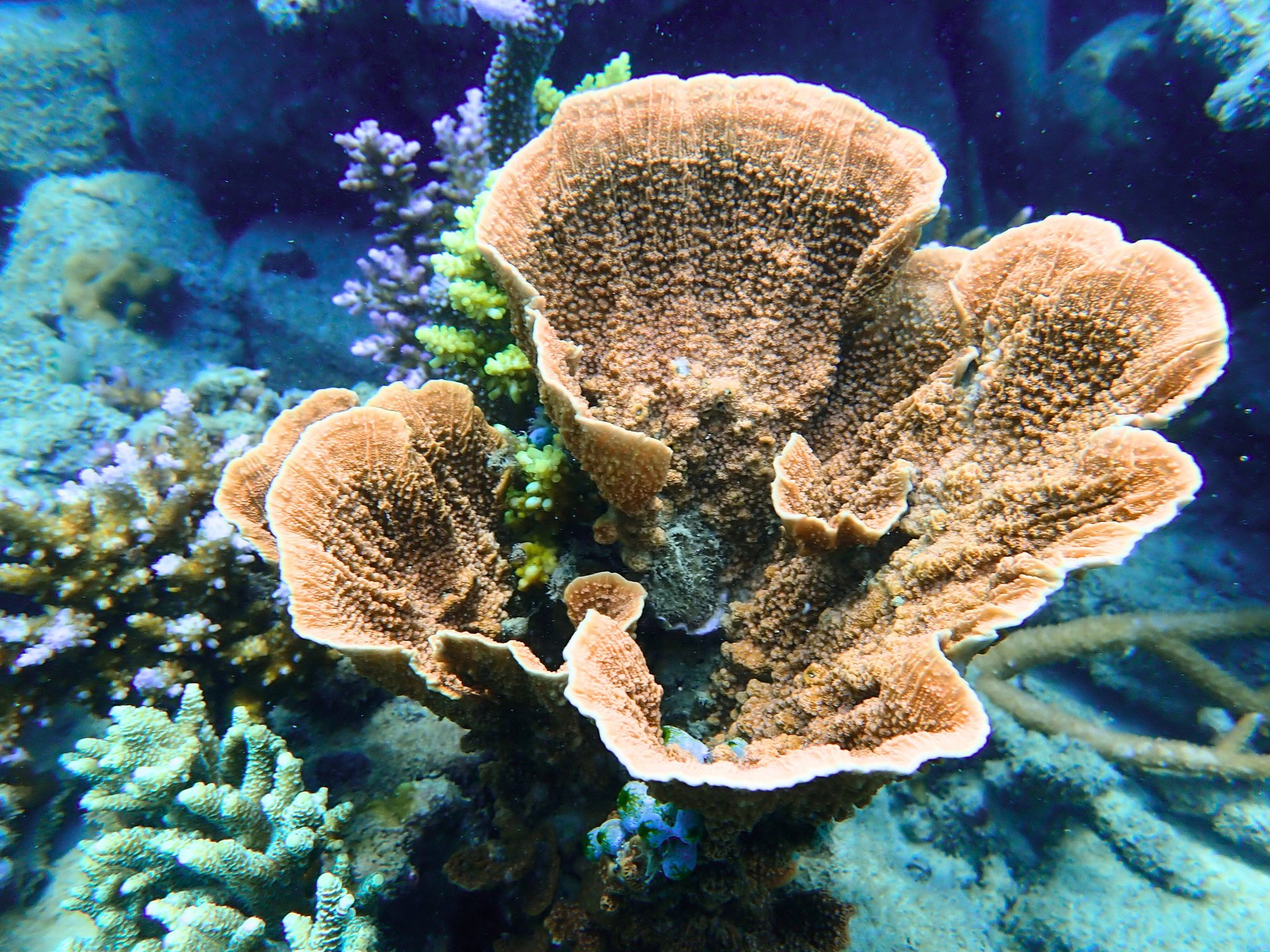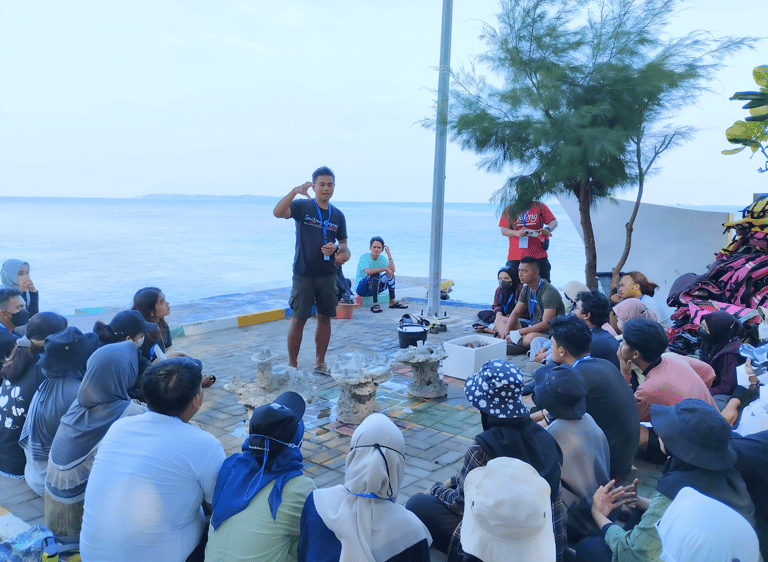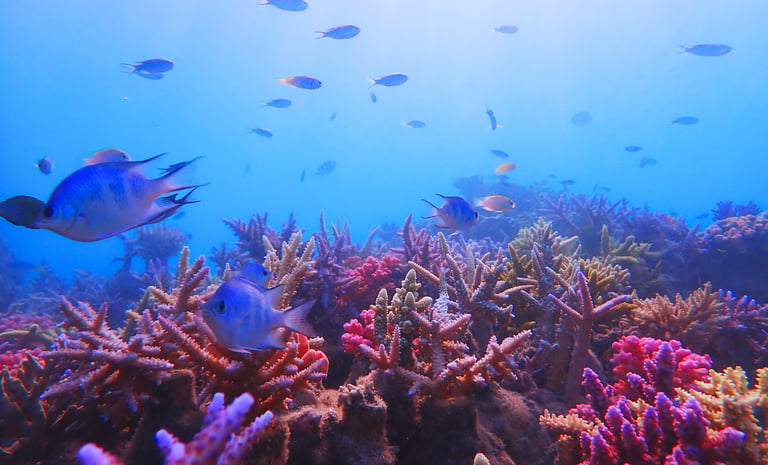
Smiling Coral Indonesia Remains Committed to Protecting the Marine Ecosystem of the Thousand Islands


Initially, SCI focused on ecotourism development as an effort to introduce the beauty of the Thousand Islands’ marine environment while also educating tourists about the importance of environmental conservation. However, since 2021, SCI has officially transformed into a non-governmental organization (NGO) to expand the scope of its conservation activities. According to SCI’s Chairman, Hermansyah, NGO status allows the organization to operate more broadly in various fields such as marine research, ecosystem rehabilitation, and community empowerment through the development of micro, small, and medium enterprises (MSMEs).
Jakarta (Greeners) – The Thousand Islands, as one of Indonesia’s marine tourism destinations, faces serious threats to its marine ecosystems due to environmental degradation and climate change. Amid these challenges, Smiling Coral Indonesia (SCI), a non-governmental organization (NGO) initiated by environmentally conscious millennials, continues to demonstrate its commitment to preserving marine ecosystems in Pramuka Island, Thousand Islands, Jakarta. Founded on National Nature Conservation Day, August 10, 2010, SCI has evolved from merely providing ecotourism services into an organization focusing on marine conservation, scientific research, and community empowerment.
SCI’s Transformation: From Ecotourism to NGO
“By becoming an NGO, we can reach more sectors and provide greater benefits—not only for ecotourism purposes but also for community welfare and overall environmental preservation,” said Hermansyah during the Kupas Komunitas event with Greeners in September 2021.
SCI’s Key Programs: Conservation and Ecotourism


This transformation has enabled SCI to build collaborations with various stakeholders, including the government and private companies, to support larger conservation programs. One example is the coral reef restoration project covering eight hectares in 2019, carried out in collaboration with an oil company operating in the Thousand Islands.
SCI has launched a number of programs to support the preservation of the marine ecosystem in the Thousand Islands. One of its flagship initiatives is the Coral Adoption Program, which was introduced in 2020. This program allows visitors to directly contribute to coral reef conservation by “adopting” corals that are then planted in the sea. To date, the program has successfully planted corals across an area of 150 square meters.
In addition, SCI is actively engaged in efforts to reduce marine debris through education and awareness campaigns targeted at both local communities and tourists. These activities include coastal and underwater clean-ups, mangrove planting, and turtle release events designed to raise awareness about the importance of protecting marine ecosystems. SCI also supports local small businesses by developing environmentally friendly products such as handicrafts and processed seafood products, helping to improve the livelihoods of the local community.
According to Hermansyah, these conservation activities not only contribute to environmental preservation but also boost tourism in the Thousand Islands. “Effective conservation goes hand in hand with increasing tourist interest. Visitors not only enjoy the natural beauty but also engage in conservation activities such as coral planting or waste clean-ups,” he explained.
Challenges: Marine Debris and Coral Trade
Despite having achieved many milestones, SCI still faces several major challenges. One of them is the issue of marine debris flowing from 13 rivers in Jakarta Bay into the Thousand Islands. According to data from the Thousand Islands Environmental Agency, this region produces around 32 tons of waste per day. This improperly disposed waste not only disrupts the marine ecosystem but also worsens the impacts of the climate crisis.
Another challenge faced is the rampant trade of corals for the marine aquarium industry. Hermansyah expressed his concern about the environmentally unfriendly practices of coral harvesting. “Corals are very sensitive and grow slowly. If they are not harvested properly, this can damage the entire coral reef ecosystem,” he emphasized.
The Importance of Coral Reefs for the Global Ecosystem
Coral reefs play a vital role in maintaining the balance of marine ecosystems, comparable to the role of tropical rainforests on land. They serve as barriers against coastal abrasion, protect shorelines from waves and ocean currents, and provide habitats for millions of marine species. In addition, the algae living within coral reef colonies absorb carbon dioxide through photosynthesis, making reefs one of the crucial natural carbon sinks in mitigating climate change.
“In a single coral reef colony, there are millions of coral organisms and algae working together to maintain nature’s balance. This is an ecosystem of immense importance to the Earth,” said Hermansyah.
SCI’s Achievements: From Coral Restoration to Scientific Research
To date, SCI has recorded a number of significant achievements. Among them is the restoration of 100 square meters of coral reef ecosystem through coral transplantation activities on Kaliage Besar Island, Thousand Islands National Park. In addition, SCI successfully restored four hectares of coral reefs by installing 3,500 cube-shaped concrete modules, in collaboration with the Jakarta Food Security, Marine, and Agriculture Agency (KPKP).
SCI has also contributed to the academic field by publishing marine scientific journals that support data collection and the development of national park management policies. The coral adoption program initiated by SCI has even been adopted by other communities, such as the Bintang Harapan Tourism Awareness Group on Harapan Island and the Komparasi Community of the Thousand Islands, which are also actively engaged in tourism, cultural, and conservation activities.
Towards a More Sustainable Future
With a spirit of collaboration and innovation, Smiling Coral Indonesia continues to strive for the sustainability of the marine ecosystems in the Thousand Islands. Through an approach that combines conservation, education, and community empowerment, SCI not only focuses on environmental preservation but also on improving the welfare of local communities. Their success in integrating ecotourism with conservation serves as an inspiration for other communities to contribute to the protection of Indonesia’s seas.
“With cooperation and shared awareness, we are confident that the Thousand Islands can remain a sustainable marine paradise for future generations,” Hermansyah concluded optimistically.
Head Office
St. Ikan Betok Susu, Pramuka Island, RT.04/RW.005, Pulau Panggang Village, Kec. North Seribu Islands District, Seribu Islands Administrative Regency, Jakarta.
© Copyrights 2025 Smiling Coral Indonesia. All Rights Reserved.
📩 Email: smilingcoralindonesia@gmail.com
Be a Part of Marine Conservation!
With Smiling Coral Indonesia, your journey becomes a real contribution to preserving our marine ecosystem.
